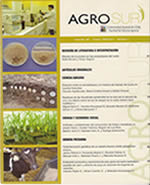ROOT DISEASE SUPRESSIVE SOILS: "TAKE ALL DECLINE (Gaeumannomyces graminis var. tritici) IN WHEAT", A CASE STUDY
Main Article Content
Abstract
Suppressive soils are a natural phenomena, they prevent or affect either the establishment of pathogens or the development of diseases affecting different crops. This review describes and discusses the bases behind this phenomenon, its global and local reports, the factors involved in the suppression and some agronomic practices that favor the development of these types of soils. Finally, we review the phenomenon of "Take all decline", which has been described around the world and also in Chile, and it is induced in soils infected by Gaeumannomyces graminis var. tritici after several years of wheat monoculture. It is associated with increasing Pseudomonas fluorescens populations able to produce the 2,4-diacetylphloroglucinol antibiotic.

